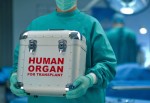It is easier to give than to receive in the transplant world.
 In a comment added to a recent article about the current financial status of Catholic Health Initiatives (the parent company of KentuckyOne Health) it was alleged that Jewish Hospital in Louisville did not accept Medicaid patients for organ transplantation. Because of the seriousness of this allegation, I was reluctant to allow it to stand without further comment. I therefore did some research and elicited comments from involved parties. The results trouble me and highlight yet another major example of the disparity of access to health care in our inherently unfair non-system, dividing Americans as it does by socio-economic status. In the case of transplantation, the operational result is particularly ugly, because the weight of government regulation and community has given us a morally indefensible result analogous to the rich stealing organs from the poor. I call this an example of the “Reverse Robin Hood” nature of America’s National Health System! Neither Jewish Hospital nor UofL are responsible for this situation, but have benefited from it. Continue reading “Financial Status a Barrier to Organ Transplantation But Not Donation.”
In a comment added to a recent article about the current financial status of Catholic Health Initiatives (the parent company of KentuckyOne Health) it was alleged that Jewish Hospital in Louisville did not accept Medicaid patients for organ transplantation. Because of the seriousness of this allegation, I was reluctant to allow it to stand without further comment. I therefore did some research and elicited comments from involved parties. The results trouble me and highlight yet another major example of the disparity of access to health care in our inherently unfair non-system, dividing Americans as it does by socio-economic status. In the case of transplantation, the operational result is particularly ugly, because the weight of government regulation and community has given us a morally indefensible result analogous to the rich stealing organs from the poor. I call this an example of the “Reverse Robin Hood” nature of America’s National Health System! Neither Jewish Hospital nor UofL are responsible for this situation, but have benefited from it. Continue reading “Financial Status a Barrier to Organ Transplantation But Not Donation.”

